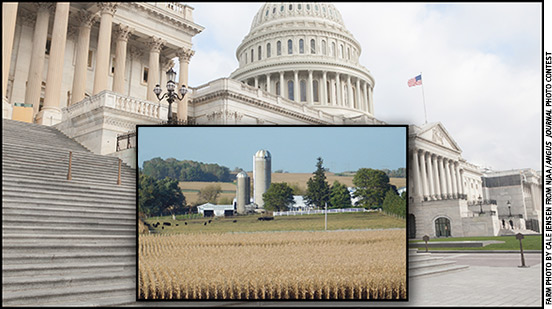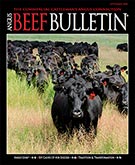
Current Farm Bill Defeated
2018 Farm Bill plans go back to the drawing board after a failure in the House of Representatives.
The House May 18 rejected the Agriculture and Nutrition Act of 2018 (H.R. 2), better known as the Farm Bill, by a vote of 198-213.
“We may be down, but we are not out,” said House Agriculture Committee Chairman Michael Conaway (R-Texas). “We will deliver a strong, new farm bill on time as the president of the United States has called on us to do.”
Lawmakers may take up a motion the following week, offered by House Speaker Paul Ryan (R-Wis.), to reconsider the Farm Bill. The legislation includes several provisions important to U.S. beef producers.
Among them is one establishing and funding a vaccine bank to deal with a potential outbreak in the United States of foot-and-mouth disease (FMD) in livestock. This version of the farm bill calls for first-year mandatory funding of $150 million for the FMD vaccine bank, $70 million in block grants to the states for disease prevention and $30 million for the National Animal Health Laboratory Network (NAHLN), which provides disease diagnostic support. For the other years of the five-year Farm Bill, there’s $30 million in mandatory funding for state block grants and $20 million to be used at the agriculture secretary’s discretion for the vaccine bank, the NAHLN and the states.
The bill also includes an amendment, proposed by Rep. Glenn “G.T.” Thompson (R-Pa.) requiring the USDA to review the school nutrition rules designed by former first lady Michelle Obama within 90 days and to propose a new set of rules within one year.
A rider sponsored by Rep. Jim Banks (R-Ind.) to repeal the 2014 Waters of the United States rule was added to the legislation on a vote of 238-173.
AgNewsWire reports that Democrats voted against the bill mainly for changes to the Supplemental Nutrition Assistance Program (SNAP) aimed at getting able-bodied adults under 60 without dependents or disabilities back to work, but it was 30 conservative Republicans wanting a vote on immigration that killed the bill.
Several industry groups and officials responded to the news. USDA Secretary of Agriculture Sonny Perdue said he was disappointed the bill is not moving forward because farmers and ranchers need the stability that is provided with a farm bill.
Agriculture Committee Ranking Member Collin Peterson (D-Minn.) responded, “It’s unfortunate the Republicans chose to take this path, and it’s clear from their inability to get the necessary votes from within their own caucus that there are internal fractures they have to contend with. But this is a good opportunity for us to return to the table and fix this bill before we move forward. As I said in my remarks Wednesday (May 16), this job is too big for one party. Let’s come together and figure out a bill that works for everyone. We don’t have to let this process be held hostage by the demands of the extremes of our parties. We can and should take the time to get the farm bill right.”
National Cattlemen’s Beef Association Executive Director of Government Affairs Allison Cooke expressed her disappointment, noting, “The bill addresses a number of priorities for producers, including an expanded foot-and-mouth disease vaccine bank, funding for environmental stewardship initiatives, and trade promotion programs. It is critical that Congress pass a new farm bill before Sept. 30 to provide certainty for cattle and beef producers.”
American Farm Bureau Federation President Zippy Duvall said that farmers and ranchers across the nation are facing real financial challenges and depend upon the risk-management tools within the farm bill. He urged Congress not to use farmers and ranchers as political pawns.
Other groups are praising the defeat of this bill, saying more work needs to be done in other areas of the bill.
National Farmers Union President Roger Johnson responded, “The rejection of the House version of the 2018 Farm Bill highlights the host of concerns that family farmers have with this failed legislation. At a time when farmers and ranchers are in significant financial strain due to years of depressed prices, this bill does not make necessary improvements to the farm safety net. It eliminates conservation programs and funding that provides them with the tools they need to be the best possible stewards of our natural resources. It reverses progress toward expanding their access to local, regional and specialty markets, and it makes unnecessary cuts to programs that feed hungry Americans.”
The National Sustainable Agriculture Coalition claimed the bill had too many loopholes and handouts for “America’s wealthiest mega-farms,” and failed “on the same day that the Government Accountability Office issued a report showing that existing commodity subsidy limitations are not sufficiently protecting taxpayers against subsidy abuses.” The group added that the current bill would have resulted in further consolidation and exacerbated challenges to beginning farmers and small- to mid-sized operations.

Editor’s Note: This article was compiled from news releases from the USDA, House Agriculture Committee, National Pork Producers Coalition, AgNewsWire, American Farm Bureau, National Cattlemen’s Beef Association, National Sustainable Agriculture Coalition, and National Farmers Union.






